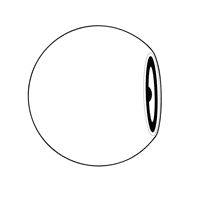Porcelain loudspeakers
Porcelain is sometimes called white gold because it is such an exquisite material for tableware and art objects. But it has never been used to produce loudspeaker casings. Until Ronald Jaklitsch, founder of mo° sound, discovered this mixture of kaolin, quarz and feldspar for himself.
The uses of ceramic are multi-fold: on the lowest level there is heavy clay ceramics such as clay-bricks, then we have earthenware and stone ware such as the famous Austrian Gmundner ceramics. And finally, in its ideal, most exquisite form: porcelain.
One good idea is not enough, however. The porcelain ball speakers have to be built, too. And this is the real challenge. Their production is so complex that all previous attempts by other manufacturers ended with the prototype. It is essential that each porcelain ball speaker pair sounds exactly the same, which is why minimal tolerance values are of utmost importance.
Why porcelain loudspeakers
Porcelain is hard and has low resonance
For our porcelain speakers we use multi-fired, hard-paste porcelain. Porcelain has a non-porous structure and a very high density.
This reduces the casing’s self-oscillation to a minimum, so the speaker membranes are not disturbed and can move freely. A vibration-free casing improves the accoustic pattern.
Its high density and non-porous structure make porcelain almost vibration-free. Furthermore, porcelain allows for very thin yet robust walls.
The walls are really thin compared to other speaker casings: at a diameter of 175 mm, the walls are only 5 mm thick. In comparison: a hardwood speaker of the same size would need walls three times as thick. Because porcelain has three times more density than hardwood.
Angular loudspeaker casing
Porcelain ball speaker
In its liquid state, porcelain can be moulded organically, which makes the production of spherical shapes possible in the first place. Production of a perfect, seamless sphere with minimal tolerance values is extremely complex. This is why only the best manufactures take up the challenge to produce ball speaker casings. We work with Weimar Porcelain in Germany.
mo° sound porcelain speakers have absolutely homogenous loudspeaker casings, nothing is bolted or glued. And naturally, mo° sound ball speakers are subjet to sophisticated quality controls.





